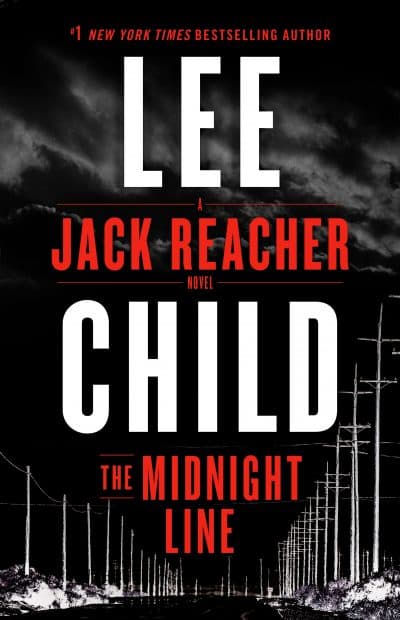Advertisement
Latest Jack Reacher Novel 'The Midnight Line' Tackles The Opioid Crisis

Jack Reacher is a 6-foot, 5-inch loner — an ex-military cop and frequent avenger. He is best-selling novelist Lee Child’s main man. Reacher has endured a lot of pain and punished a lot of bad guys, beginning two decades ago and continuing through Child’s latest novel, "The Midnight Line."
Readers can generally be assured that Reacher, while not actively looking for a scrap, will at some point confront a small gang of thugs and single-handedly thrash them, mostly pummeling them with his fists. That happens pretty quickly in Child's 22nd novel -- it might be either a bit of sly self-parody or just that the author wanted to get that bit out of the way early.
“It was kind of like that,” says Child, on the phone from his Manhattan home. “But Reacher started the book in kind of a down mood because the woman he was interested in vanished. So, he’s a little cross. I thought ‘Yeah, let’s not exactly get it out of the way early, but let’s just show how cross he is.’ My favorite part of it is at the end where the guy says, ‘Feel better now?’ and he says something like ‘Not really’ or ‘A little.’ That frustration is part of Reacher’s life.”
Reacher has participated in a fair amount of mass mayhem and uncovered many far-ranging criminal conspiracies over the past two decades, but "The Midnight Line" operates on a smaller scale. Reacher, who is peripatetic — or homeless by choice — always starts out on a road to nowhere. No possessions except what’s on his back. No cell phone. No credit cards. He generally begins his day by hitching a ride or hopping a bus.
Child, who just turned 63, shares Reacher’s height if not all his physical abilities. He admits that part of Reacher’s man-without-a-home persona is indulging a fantasy.
“It’s a multipurpose thing,” the British-born New Yorker says. “First of all, it gives me tremendous flexibility in terms of setting the story and in terms of location and pitch. It can be anything. It can involve high level stuff like FBI or CIA or it can just be [set in] a nothing town. Part of the strength is that total flexibility and part of it, sure, is wish fulfillment.
“Over the span [of writing Reacher], it has involved 9/11, which was four years after I started, and then it involved the 2008-2009 financial crash. After each occurrence, there has been a change in people’s response to Reacher. After 9/11, they desperately wanted this tough guy who would solve problems for them and after the financial crash, the idea that the possessions own you rather than you own the possessions came to the fore and people got more and more enthusiastic about Reacher’s lifestyle. You could live with absolutely no ties or commitments to the organized world.”
In "The Midnight Line," Reacher has hopped a bus, finds himself in Wisconsin — "the sad side of a small town" — goes into a pawn shop and purchases a small woman’s ring that intrigues him. It has her initials on it and an inscription implies she was a West Point cadet, as was he, many years prior.
Who is she? Why did she pawn the ring? Might she be in trouble? Alarm bells go off in his head, and so, Reacher’s latest great adventure has begun. The trail leads to South Dakota and deep into the Wyoming woods.
It’s a tale that unfolds slowly and the bigger reveals are late in the book. “You’ve got to find a balance,” says Child, of the deliberate pacing. “What would be the alternative to that? A constant wham-bam series of action? Ultimately, I think that becomes numbing. Relentlessly fast-paced becomes almost the same thing as no pace at all. It’s all about the variation and the slow build. But it’s risky.
" 'The Midnight Line' starts out in the most trivial way possible," Child says, "an aimless stroll, an accidental discovery that he knows nothing about and then it becomes a fairly patient quest story for quite a long time. I’m hoping, obviously, the reader is initially intrigued about the pathos. I’ve got to rely on that being sufficiently compelling that the reader will stay with it as we start to make some progress.”
There is not the amount of carnage Reacher has sometimes found and participated in, but "The Midnight Line" is not without graphic violence. Consider this passage:
There was a wet thump like a watermelon rolling off a table and then immediately the flat crack of a supersonic NATO round in the air, and the antique bark of an M14 firing. [A character’s] head came apart in an instant cloud of red mist, and fragments of it followed his body down, vertically, like a disappearing trick, into a puddle of clothes and limbs and lifeless flesh.
“I start with no preconceptions, the story will be whatever it is and some of them are gruesome,” says Child. " 'Make Me' was one of them; some others less so. In fact, 'Never Go Back' is the only book where Reacher does not kill somebody and nobody really noticed that — that he went through a whole book without committing a homicide. It’s sort of taught me you can make changes; it can be whatever it needs to be for that book and people don’t really mind. I think they’re not necessarily looking for a slugfest in every book.”
What readers get here is another kind of conflict: the opioid crisis, specifically the one that’s ripping apart rural America. More than a few of the people Reacher encounters are addicts. The main victim has suffered horrific wounds and comes to addiction through legal painkillers. While Child elucidates the debilitating power of addiction, there’s another thing he does, boldly and perhaps controversially: He evokes the pleasure the opioids can render.
"You’ve got to look at the facts with an open mind and inevitably some of the facts are going to be inconvenient."
Lee Child
“You’ve got to look at the facts with an open mind and inevitably some of the facts are going to be inconvenient, one of which is an opiate is a wonderful thing,” says Child. "These people live hard, hard lives and they need to take the edge off and the opiates meet their needs in a spectacular way. And clearly always have.
“We just had some archaeological research, which shows that people were smoking opium 5,000 years ago during the Iron Age. It’s clearly baked into the human physiology. We will not solve the problem unless we start from square one which is to say, ‘This is extremely attractive to a lot of people.’ We’ve got to go from there, rather than from a position of just disapproval and prohibition. We’ve got to understand the reasons," Child says. "Obviously, the way to do it is to erase the reason rather than tackle the substance. And that is a stumbling block for any kind of problem-solving in my experience. That is absolutely the giant task.”
As for Reacher, there’s a point where he goes out of his way — to put it mildly — to try to get the suffering addict a supply that will last until the addict can turn that life around. (He breaks more than a few laws along the way.)
“It’s in the tradition of a noir novel where there is not necessarily any good answer,” Child says. “The solution is not necessarily perfect. It’s a bad thing made slightly less bad. To me, it also goes to another point about an author’s relationship with a long-running character, which is: It’s absolutely fatal to fall in love with the character and protect him from such questions. If you are conscious of saying ‘I want him to be popular’ then you start compromising and the story becomes less organic.
“[You say], 'This is what Reacher would do and I’m going to be honest about portraying it.' He has a very strict code of morality but it doesn’t necessarily coincide with the law and it doesn’t necessarily coincide with majority opinion. He’s purely practical about it. He needs to solve the problem in the short term and the long-term problem he will leave for another day.”

Where Child is loquacious and refined, Reacher is anything but. He speaks in short, sharp sentences. "I wanted the idea of a character who is so alienated he probably doesn’t talk much at all," says Child. "Certainly, you can imagine Reacher can go days and days without a reason to say anything to anybody."
There have been two movies based on the character, both featuring the 5-foot, 7-inch Tom Cruise playing Reacher. (Fans reacted to the news the same way Anne Rice fans reacted when it was announced Cruise would play the Vampire Lestat in the 1994 movie “Interview with the Vampire.”) The first Reacher movie was very good, the second, not so much. Either way, Child feels his fans can separate the Reacher on the page (and in their minds) from the one on screen. There are currently no plans for a third movie, Child says.
All his books have been optioned, but Child says he never has and never will write with a movie in mind. “I feel if you were to do that you would end up with a bad book and a bad movie,” he says. “It should be one thing or the other. I wouldn’t write Reacher the way I write him if I had one eye on the movie. Reacher is such an internal character. Most of the good stuff about Reacher happens in his own head -- his thoughts, his reactions, his process. It is very hard to put an internal character on the screen.”
Child say he’s “about 15 percent of the way through [a new Reacher] and the way it’s shaping up I have no idea what it’s going to be about or what’s going to happen, but it’s moving along.”
Will Child ever veer from Reacher to do a standalone thriller?
“Probably not,” he says, “because I think basically this is a relationship between the writer and the reader and it’s transactional. The reader wants something; the writer provides. I’ve got 22 years worth of evidence there that readers want Reacher. If I was to say, to suit myself, 'I’m going to do something different this year,' I think first of all that’s a kick in the teeth for the reader and it confuses them. I think it would be a fundamental mistake.
"None of us can write everything we want to write. There’s a certain amount of practicality about it. The saving grace is that although each author is a complete individual there are lots of authors so the reader basically has an unlimited choice. I’m perfectly happy for the reader going, ‘I’m sick of Reacher now, I’m going to go and read somebody else.’ That’s fine. I know perfectly well other readers are going, 'I’m sick of these other guys and now I’m going to try Reacher.' "
